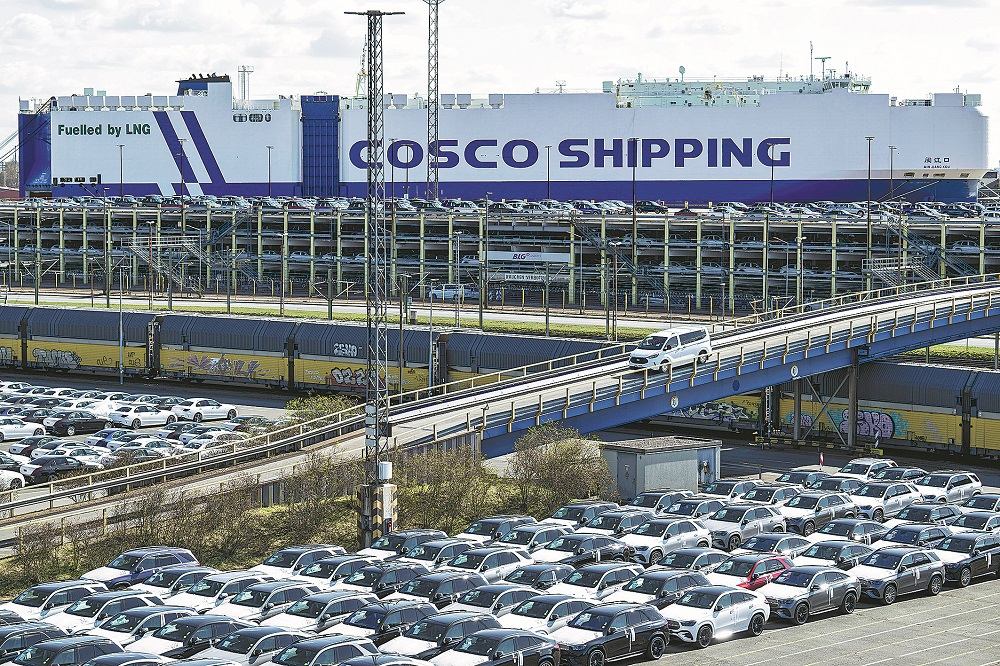Carmakers in Germany face US tariff woes
Supply chain disruptions cautioned as auto industry stares at price hikes
By ZHENG WANYIN in London | China Daily Global | Updated: 2025-04-16 09:17

The United States' latest 25 percent tariffs on all auto imports is set to deal another blow to Germany's already struggling car industry, experts say, warning of potential fallout for the export-reliant sector.
The US was the top destination for German car exports last year, accounting for 13.1 percent of the total, according to the German Federal Statistical Office.
For specific brands, Porsche derives 24.5 percent of its global unit sales from the US, while Volkswagen, Mercedes-Benz and BMW each sees more than 16 percent of sales coming from the country, according to a March analysis by ING Think, the research division of Dutch bank ING.
The new tariffs are expected to significantly raise the prices of imported cars in the US, hindering the German auto sector whose growth has long been fueled by exports.
Hildegard Mueller, president of the German Association of the Automotive Industry, said in statements that the tariffs could pose a "massive burden and challenge" for carmakers and the global automotive supply chain.
She urged the European Union to "put all options" on the negotiation table and called on the German government to "do everything possible" to boost industrial competitiveness.
The German auto industry operates across more than 2,000 locations and employs about 138,000 people in the US, which Mueller described as "the best example of local production that has existed in the US for decades and is deeply interwoven with the US value chain".
However, even having a US presence does not make German carmakers immune to the tariffs, as duties also apply to certain auto parts, adding another layer of costs on top of the existing 25 percent tariffs on steel and aluminum.
As a result, car prices are expected to rise between $5,000 and $10,000 on average, and by as much as $50,000 in the luxury sector, The Guardian reported.
Halting deliveries
Many auto companies are already bracing for that impact. Audi, which has no production sites in the US, has suspended deliveries of vehicles that arrived at US ports after April 2. A spokesperson said shipments would be frozen "until further notice".
BMW told The Wall Street Journal last month that the tariffs would shrink earnings by $1.1 billion this year.
US President Donald Trump has long complained about the trade deficits the US runs with the EU.
Last year, 757,654 new vehicles were exported from the EU to the US, valued at 38.9 billion euros ($44.1 billion), while only 169,152 new US-made cars went in the opposite direction, for 7.8 billion euros, according to EU statistics agency Eurostat.
Another "unfairness" noted by the White House is that US duties on imported passenger cars stand at just 2.5 percent, much lower than the EU rate of 10 percent.
However, Ferdinand Dudenhoeffer, director of Center Automotive Research in Bochum, Germany, told China Daily that the calculation was "fake news".
"There is a 25 percent 'chicken tax' that applies to light trucks imported into the US. So, it's unfair to tell the public that the EU has advantages against the US."
The "chicken tax", introduced in the 1960s in retaliation for tariffs by France and the then West Germany on US poultry, still applies to vehicles such as utility vans and pickup trucks. According to the digital auto publication CarBuzz, the measure has long benefited US automakers, helping them edge out European models and dominate the truck market.
Consumer preferences
In addition, Dudenhoeffer said the trade imbalance was mainly driven by consumer preferences, as pickups with bigger engines and higher fuel consumption — favored by US customers — have little market in Europe, where fuel is more expensive than in the US. "So, the second fake news is that Europe has blockades to bring cars from the US."
Despite that, Trump insists on the tariffs as "medicine" and believes they will lead to a reshoring of manufacturing and investment.
Dudenhoeffer said it remains uncertain whether the "medicine" will really work.
"Nobody knows exactly what is going on in the US. Nobody knows how long the taxes will be in place, maybe three months, two years, or 10 years. Nobody knows how the prices will change for products. So, why should I invest in a country where I don't know anything about its future?"
Inga Fechner and Rico Luman, senior economists at ING Think, wrote in an analysis that even if manufacturers relocate to the US, the idea of "one-stop shopping" is an "illusion", because the auto industry is deeply globalized, with parts sourced from all over the world.
Dudenhoeffer said the present automotive production system has been shaped by manufacturers setting up bases around the world for specific models tailored to local demand, in order to achieve scale effect.
For Germany's struggling auto industry — burdened by a delayed transition to electric mobility, rising labor and energy costs, and intensifying foreign competition — Dudenhoeffer called for a consistent long-term strategy domestically and more collaborations with Chinese counterparts.
"We are in a century where we can learn from China," he said. "In the past, China learned from us. Now, China has innovations that are very important for our carmakers and suppliers to become successful in the future. We need the politicians to understand that. Because that will be a win-win game."
























